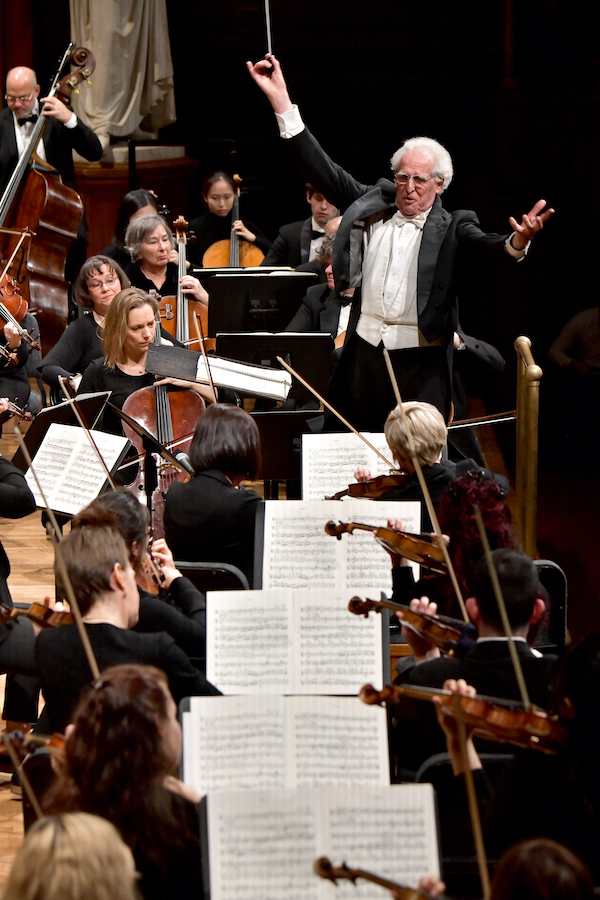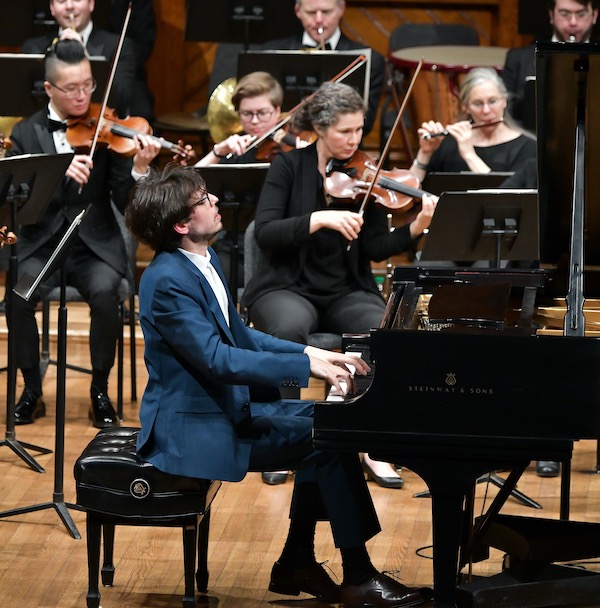Debargue finds depth in Liszt with impressive Boston Philharmonic debut

Like a lot of Bostonians who follow classical piano, conductor Benjamin Zander tuned in to the 2015 Tchaikovsky Competition to cheer on a hometown favorite — the New England Conservatory’s own George Li — and found himself also captivated by another contestant: French pianist Lucas Debargue.
Debargue finished out of the medals but made a great impression. Today he’s a hit with audiences and critics alike, thanks to his fresh interpretations of virtuoso repertoire and Glenn Gould-like energy at the keyboard. Thursday night at Sanders Theatre he made his Boston debut playing Liszt’s Piano Concerto No. 2 with Zander and the Boston Philharmonic.
The pianist has a formidable, if unorthodox, technique. Self-taught in the early years of his career, he plays with an unusual fingering style — scale passages, for instance, are sometimes rendered with little more than the thumb and index finger. Yet Debargue performs with such cohesion and dexterity that his odd technical choices are virtually unnoticeable.

Liszt’s spellbinding Second Concerto provides a perfect vehicle for Debargue, who relishes the more intimate aspects of this music. The work largely eschews the crash-bang intensity of the First Piano Concerto in favor of searching expression. Cast in a single movement, the Second features the pianist less as a hero struggling against orchestral forces than as a collaborator — especially in the concerto’s memorable wind and string passages. Debargue’s performance Thursday illuminated this score for what it really is — a musical canvas adorned with chamber-like delicacies.
He made easy work of the difficult passages, tossing off the blazing octaves and runs without resorting to self-indulgence. The concluding march likewise brought just enough pomp and intensity, with Debargue’s bold chords and Zander’s fluent leading of the powerful orchestral forces ultimately serving expressive ends.
Pianist and the orchestra were simpatico partners in the lyrical opening theme — which unfolded with woodwinds as a backdrop for Debargue’s supple arpeggios — and in the theme unveiled later by cellist Rafael Popper-Keizer, where Debargue’s accompanying figures took on an almost Schubertian subtlety. This performance was chamber music at its most sublime.
Rapturous applause brought Debargue back to the stage for two encores: the tender Nostalgie du pays by Milosz Magin, and Scarlatti’s fiery Sonata in A major.
The dynamism and sensitivity displayed in the concert’s first half carried into Zander’s reading of Dvořák’s Symphony No. 7, a collage of biting Czech rhythms, arching melodies and thick, almost Brahmsian orchestral textures.
Zander’s probing interpretation drew attention to every bold contrast: the dark and mysterious opening theme striking a perfect balance with the incisive rhythms that followed; and the second theme exhibiting a charming sweep and grandeur before another bout of agitation. Zander steered the entire first movement decisively through its climactic peaks and releases.
The second movement showcased the orchestra’s superb wind and brass sections, the former offering svelte treatment of the opening call, and the theme soaring in the French horns on its later return. In Zander’s hands, the third-movement Scherzo was a true Furiant as he deftly led the players through its quick shifts of meter. Burbling wind figures brought a bucolic vitality to the trio and the finale was a true culmination. Zander shaped its theme into statements that coursed, shifted direction abruptly and surged in the bold closing chords.
Zoltán Kodály’s Dances of Galánta made for an equally stirring opener. The composer’s energetic, Roma gypsy-inspired work from 1933 runs 15 minutes and bounds freely between dance steps and softer lyrical passages containing the exotic colors of Eastern European folk music.
Zander’s crystal-clear direction let the rhythms really lilt. Rane Moore’s clarinet solo flowed with improvisatory freedom, and the strings brought robust intensity to the ensuing dances.
The graceful flourishes of the third dance culminated in a wild frenzy, and the final dance galumphed appropriately before the closing flourishes brought an exciting conclusion to a work of urgency and radiant virtuosity.
The program will be repeated 8 p.m. Saturday at Jordan Hall and 3 p.m. Sunday at Sanders Theatre. bostonphil.org; 617-236-0999.
Posted in Performances